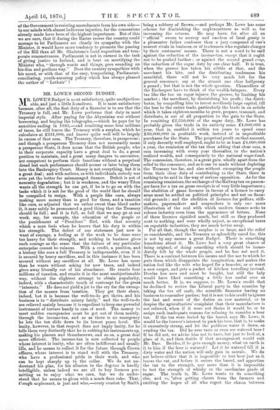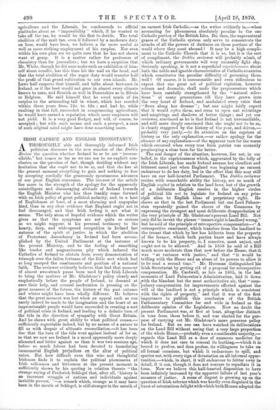MR. LOWE'S SECOND BUDGET.
MR. LOWE'S Budget is most satisfactory, quite unobjection- able, and just a little humdrum. It is most satisfactory because, after all, the first duty of a financier is to see that the Treasury is full, and Mr. Lowe performs that duty in most imperial style. After paying for the Abyssinian war without borrowing, and buying the telegraphs,—which he pays for by annuities ending in 1885,—and remitting some four millions of taxes, he still leaves the Treasury with a surplus, which he calculates at £331,000, and knows quite well will be largely in excess of that sum. The Treasury, therefore, is prosperous ; and though a prosperous Treasury does not necessarily mean a prosperous State, it does mean that the British people, who in their corporate capacity have a great deal to do, a great position to maintain, and a great many dangers to encounter, are competent to perform their functions without a perpetual dread lest such performance should sooner or later bring them into the Bankruptcy Court. Money is not everything, but it is a great deal ; and with nations, as with individuals, nobody was ever yet the better for mismanaged finance. Deficit is not of necessity degradation ; but it is weakness, and the weary Titan wants all the strength he can get, if he is to go on with the tasks which it is not for the good of the world that he should be compelled to resign. With a people like ours, always making more money than is good for them, and a taxation like ours, so adjusted that we rather sweat than bleed under it, it may safely be pronounced a good thing that the Treasury should be full ; and it is full, so full that we may go at our work, say, for example, the education of the people or the punishment of "President" Riel, with that serenity which a man feels when he knows that his duty is within his strength. The defect of our statesmen just now is want of courage, a feeling as if the work to be done were too heavy for their strength, and nothing in business gives such courage as the sense that the failure of any particular enterprise cannot be ruinous. With a credit, a position, and a history like ours a full Treasury is indispensable, even if it is secured by heavy sacrifices, and in this instance it has been secured without any sacrifices at all. Mr. Lowe has more than he wants without asking for new taxes, and indeed gives away liberally out of his abundance. He remits four millions of taxation, and remits it in the most unobjectionable way, without the slightest attempt to obtain popularity, indeed, with a characteristic touch of contempt for the great, "interests." He does not yield a jot to the cry for the exemp- tion of the manses from taxation. They get their share, indeed, but it is because the well-to-do get theirs, and his business is to " distribute misery fairly," and the well-to-do are relieved mainly because it is expedient to keep one powerful instrument of torture handy in case of need. The money to meet sudden emergencies must be got out of them mainly, through the income-tax, and .so as there is no emergency he lets the tax slide down to its lowest peace level. His lenity, however, in that respect does not imply laxity, for he tells them very distinctly that he is rubbing his instruments up, making his pincers and thumbscrews, and so on, a great deal more efficient. The income-tax is now collected by people whose interest is lenity, who are often indifferent and usually idle, and he means to collect it for the future through Crown officers, whose interest is to stand well with the Treasury, who have a professional pride in their work, and who can be kept sharply up to the collar. We do not un- derstand his plan, for his allusion to the dog-tax is hardly intelligible, unless indeed we are all to buy licences per- mitting us to enjoy what we earn, but we do under- stand that he means to glean with a much finer rake. That, trough unpleasant, is just and wise,—every evasion by Smith being a robbery of Brown,—and perhaps Mr. Lowe has some scheme for diminishing the unpleasantness as well as for increasing the returns. He may have, for after all an " official " sworn to secrecy and careless of local gossip is a pleasanter father confessor than a jury composed of one's nearest rivals in business, or of tradesmen who regulate charges by their customers' means. There is not a word to be said against the reduction of the income-tax, except that it ought not to be pushed farther ; or against the second grand coup, the reduction of the sugar duty by one clear half. It is true, when the grower has taken his nibble at that, and the merchant his bite, and the distributing tradesman his mouthful, there will not be very much left for the general consumer, say at the utmost one clear halfpenny a pound ; but that is not the whole question. Chancellors of the Exchequer have to think of the wealth-bringers. Every tax like the tax on sugar injures the grower, by limiting his market ; the merchant, by diminishing his profit ; the distri- butor, by compelling him to invest needlessly large capital, till the loss to the entire trade, particularly the trade in an article which it takes eighteen months to grow, prepare, transmit, and distribute, is out of all proportion to the gain to the State. In remitting £2,350,000 of the sugar duty, Mr. Lowe has probably given the trade in its entirety some £4,000,000 a year, that is, enabled it within ten years to spend some £40,000,000 in profitable work, instead of in unprofitable purchases for the State. The perpetual profit on that amount, if only decently well employed, ought to be at least £4,000,000 a year, the remission of the tax thus adding that clear sum, a sum increasing with every year thereafter, to the nation's realized wealth, and consequently to the national wage-fund. The concession, therefore, is a great gain, wholly apart from the relief to the consumer, and as it can be made without depleting the Treasury too far, and also without exempting the people from their clear duty of contributing to the State, there is nothing to be said in the way of serious opposition. As for the remaining remissions, the exchange of the Railway tax on passen- ger fares for a tax on gross receipts is of very little importance ; the abolition of game licences in favour of a licence to carry arms must be settled on political principles and not on finan- cial grounds ; and the abolition of licences for pedlars, still- makers, papermakers and soapmakers is only one more illustration of the zeal with which modern finance seeks to release industry even from the appearance of fetters. None of these licences signified much, but still as they produced next to nothing, and were wholly unjust, as exceptional taxes on reputable industries, they are much better away.
For all that, though the surplus is so large, and the relief so considerable, and the Treasury so splendidly cared for, this is not by any means a great Budget. There is something humdrum about it. Mr. Lowe had a very great chance of being original, of doing something which should be imme- diately felt by the whole people, and he has not used it. There is a contrast between his means and the use to which ho puts them which disappoints the imagination, and makes the nation feel like the wife who hoped for a bracelet, or at worst a new carpet, and gets a packet of kitchen towelling instead. Dowlas has uses and must be bought, but still the lady would have liked something a little less useful ever so much better. It is, we suppose, to Mr. Lowe's credit that he declined to revive the Liberal party in the counties by taking the tax off malt, the scientific financier having no business to remember parties; but it is not to his credit to ignore the last and worst of the duties on raw material, or to despise the agriculturists' coniplaint that their manufacture is not relieved, when if it were not theirs it would be, or to assign such inadequate reasons for refusing to consider a beer tax. If the tax were levied by the barrel, says Mr. Lowe, it would be the brewer's interest to pack his beer, that is, to make it excessively strong, and let the publican water it down, so evading the tax. Did he ever taste or even see watered beer ? If he did not, we advise him not to taste, but just to look at, a glass of it, and then decide if that arrangement would suit Mr. Bass. Besides, if he gets enough money, what on earth is it to him if the beer is watered ? Let it be watered till it is dirty water and the nation will only gain in morale. We do not believe either that it is impossible to test beer just as it leaves the vat, and before it enters the barrel, and apportion the tax to the strength, any more than it is impossible to test the strength of whisky or the saccharine grade of sugar. The, truth is, Mr. Lowe wants to do something else, and so, 'after getting cheers from the farmers and exciting the hopes of all who regret the chasm between agriculture and the Liberals, he condescends to official platitudes about an " impossibility " which, if he wanted to take off the tax, he would be the first to deride. The total abolition of the malt tax, even if followed by a moderate duty on beer, would have been, we believe, a far more useful as well as more striking employment of his surplus. Nor even within his own plan are we quite sure that he has not shown want of grasp. It is a matter rather for professors of chemistry than for journalists ; but we have a suspicion that Mr. White, though he did once make such an exhibition of him- self about comfits, has this time hit the nail on the head, and that the total abolition of the sugar duty would transfer half the profit of that grand cultivation to our own islands. Mr. Lowe half suspects that himself, and talks about beet-root in Ireland, as if the beet would not grow in almost every climate known to man, and flourish as well in Dorsetshire as in Silesia or Belgium. He said himself that he owed much of his surplus to the astounding fall in wheat, which has receded within three years from 72s. to 42s. ; and had he, while exulting in that fall, succeeded in compensating agriculture, he would have earned a reputation which mere surpluses will not yield. It is a very good Budget, and will, of course, be accepted ; but with such means and such a prospect, a man of such original mind might have done something more.































 Previous page
Previous page